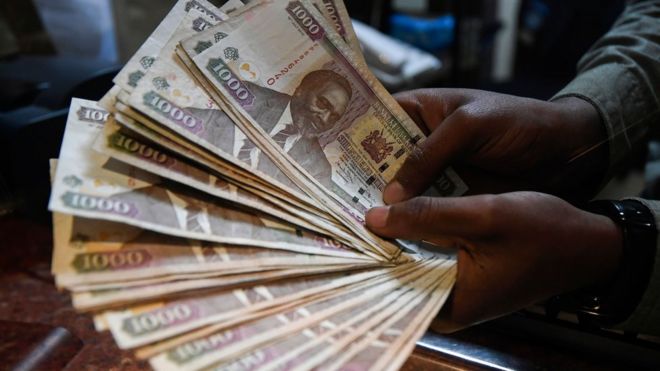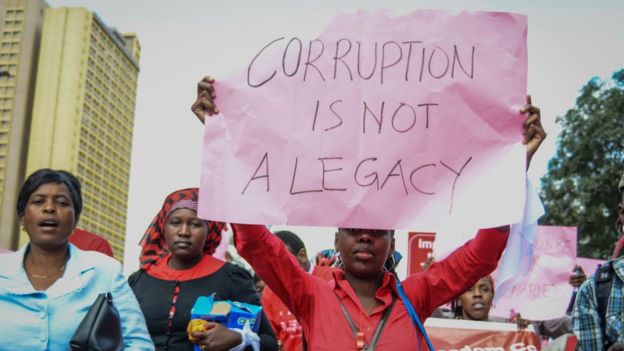
In our series of letters from African writers, Kenyan journalist Waihiga Mwaura asks whether Kenyans have lost hope of tackling the scourge of corruption in the country.
Shocking revelations over the last month that Kenya may have lost 21bn shillings ($210m; £162m) of taxpayers' money only resulted in a few newspaper headlines.
Dubbed the dam scandal, investigators are looking
into allegations that the money was spent on two dams in the Rift Valley that have never been built.
Kenyans like to get outraged on Twitter, but the social media hoo-ha petered out fairly quickly amid some political statements and promises to investigate.
The truth is that Kenyans have been here before. Different scandals. Different suspects. Different amounts of money. Same taxpayers footing the bill.
'Legalise corruption'
In the latest scandal, it is alleged that one firm was paid $80,000 for cutlery, while another company supplied towels worth $220,000.
These are not strange items to supply - until you ask yourself: "What role do they have to play in the construction of a dam?"
No wonder popular musician and activist Juliani recently suggested that corruption should be legalised and defined in Kenya so that everyone knows what they are dealing with.
And these are not the most surprising revelations that have come out of graft investigations in Kenya.
In 2016 a hairdresser was at pains to explain how she had gone from a simple hair stylist to a millionaire who had set up companies to receive $18m from National Youth Service - a government initiative to train young people in life and business skills.
The hairdresser denied the allegations but the entire scandal involving the youth agency is believed to have cost taxpayers $78m through payments to ghost suppliers - yet the results of the full investigation into the alleged scam are still to be published.
Kenya's top corruption scandals
 GETTY IMAGES
GETTY IMAGES
The Goldenberg scandal
In the 1990s, members of the Kenyan government colluded with the international company Goldenberg to export gold that had come from third countries at subsidised prices. Although the scheme was supposed to earn the country money, it ended up costing an estimated 60bn shillings - 10% of Kenya's annual GDP. Officials of former President Daniel arap Moi's government, some at the highest level, were implicated in the scandal.
A 2004 commission of inquiry recommended that several prominent people be investigated but no-one has been jailed.
The Anglo Leasing scandal
The Anglo Leasing affair, which involved contracts being awarded to phantom firms, shocked Kenyans when it was revealed in 2004.
Anglo Leasing Finance was paid about 30m euro ($33m; £21m) to supply the Kenyan government with a system to print new high-technology passports; other fictitious companies involved in the scam were given money to supply naval ships and forensic laboratories.
In 2015, seven former government officials were charged. The case is still ongoing.
The National Youth Service scandal
Last year, the head of the National Youth Service (NYS) was arrested as part of an investigation into the alleged theft of 8bn shillings. The missing funds were allegedly stolen in a scheme involving senior government officials and ghost suppliers.
Prosecutors have charged 35 people. All have denied the accusations.
Getting worse
It is now possible to work out how much Kenya has lost to corruption since independence in 1964 - the website trackcorruption.org has put the figure at an estimated $66bn.
This is public money that has been lost, stolen or misused - funds that could have built schools, hospitals and many dams.
Transparency International announced in its latest report that corruption was getting worse in Kenya - on its corruption index Kenya was ranked 144 out of 180 countries in the world, dropping a place in the last year.
Samuel Kimeu, executive director of Transparency International Kenya, said in January: "Some of the key institutions in the anti-corruption chain have faced significant challenges in delivering their mandates mainly because of a pervading culture of impunity among the political and economic elite."
A notable anti-graft crusader recently told me that corruption was no longer a parasite in Kenya but was now firmly entrenched at the centre.
 |
| Kenyans have held many protests against corruption but little has changed |
Marilyn Kamuru, a lawyer and activist, urged Kenyans on a live TV show to stop calling it corruption and instead call it "robbery with violence".
Many applauded her statement, urging fellow Kenyans to stop pussyfooting around a crisis and call it by its real name.
But life goes on in one of East Africa's largest economies and even the Kenyan shilling is no longer surprised by the revelations - it has jumped to its strongest level against the dollar in more than three-and-a-half years in the last week.
Don't get me wrong- it isn't that Kenyans have just buried their heads in the sand.
Everywhere I go, corruption is the discussion. From the barbershop and hotel conference to the TV studio and family gathering. People are angry. But nothing happens after that.
But all is not lost.
One recent encouraging stories was how a young airport security officer in Kisumu had compelled a police officer (effectively his superior) to pay a fine. The policeman had parked on the pavement, his vehicle was then clamped and when he returned to it, he had no choice but to pay the fine after he realised that he could not bully his way out of this one.
That is a classic example of speaking truth to power.
Source: BBCNews

No comments:
Post a Comment
Add a Comment...